培养信任,创造知识:考古劳动的管理和学科的形成
IF 0.8
2区 历史学
Q2 HISTORY & PHILOSOPHY OF SCIENCE
引用次数: 1
摘要
像任何一门科学一样,考古学依赖于参与知识生产的行动者之间的信任。在考古学的早期历史中,这种认识论的信任被中东东方主义的历史和更广泛的殖民主义复杂化了。支撑19世纪和20世纪早期考古学的种族和权力动态排除了外国考古学家和当地雇佣劳工之间人际道德信任的可能性。鉴于此,考古学家创造了奖励、惩罚和监视系统,以确保现场工人的诚实行为。因此,他们发明了一套结构条件,为考古研究的进行提供了足够的认知信任——这一体系直到今天仍在继续塑造考古学。本文章由计算机程序翻译,如有差异,请以英文原文为准。
Cultivating trust, producing knowledge: The management of archaeological labour and the making of a discipline
Like any science, archaeology relies on trust between actors involved in the production of knowledge. In the early history of archaeology, this epistemic trust was complicated by histories of Orientalism in the Middle East and colonialism more broadly. The racial and power dynamics underpinning 19th- and early 20th-century archaeology precluded the possibility of interpersonal moral trust between foreign archaeologists and locally hired labourers. In light of this, archaeologists created systems of reward, punishment, and surveillance to ensure the honest behaviour of site workers. They thus invented a set of structural conditions that produced sufficient epistemic trust for archaeological research to proceed—a system that continues to shape archaeology to the present day.
求助全文
通过发布文献求助,成功后即可免费获取论文全文。
去求助
来源期刊

History of the Human Sciences
综合性期刊-科学史与科学哲学
CiteScore
1.60
自引率
11.10%
发文量
31
审稿时长
>12 weeks
期刊介绍:
History of the Human Sciences aims to expand our understanding of the human world through a broad interdisciplinary approach. The journal will bring you critical articles from sociology, psychology, anthropology and politics, and link their interests with those of philosophy, literary criticism, art history, linguistics, psychoanalysis, aesthetics and law.
 求助内容:
求助内容: 应助结果提醒方式:
应助结果提醒方式:


